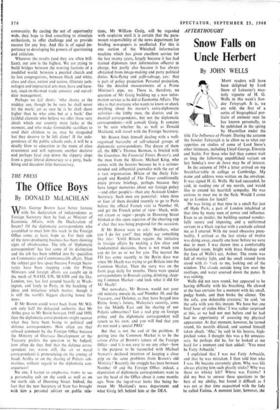The Office Boys
THE PRESS
By DONALD McLACHLAN
WILL George Brown have better fortune with his declaration of independence as Foreign Secretary than he had, as Minister of Economic Affairs, with the Declaration of Intent? Of the diplomatic correspondents who assembled to meet him this week in the Foreign Office some, at least, hope so. For their side of the news-producing business has been showing signs of obsolescence. The title of 'diplomatic correspondent' has lost some of its distinction and the job has been nibbled into by specialists on Communist and Commonwealth affairs. Then the subject gets less space because Foreign Secre- taries have been stepping aside for Prime Ministers and foreign affairs are caught up in the mesh of NATO, UN, SEATO and the like. London, too, has lost ground heavily to Wash- ington, and lately to Paris, in the hatching of ideas and initiatives which matter; though it is still the world's biggest clearing house for news.
If Mr Brown could wrest back from Mr Wil- son only half the delegated authority that Mr Attlee gave to Mr Bevin between 1945 and 1950, then the diplomatic correspondents might recover what they have been losing to political and defence correspondents. How often are they refused comment by the Foreign Office because the Ministry of Overseas Development or the Treasury prefers the question to be fudged; how often do they find that the defence corre- spondent (or, worse still, the air or naval correspondent) is pronouncing on the arming of Saudi Arabia or on the sharing of Polaris sub- marines, without regard to the diplomatic con- sequences!
No one, I hasten to emphasise, wants to see a personality cult on the south as well as on the north side of Downing Street. Indeed, the fact that the new Secretary of State has brought with him a personal adviser on public rela-
tions, Mr William Greig, will be regarded with suspicion until it is certain that the para- mount responsibility of the news department for briefing newspapers is unaffected. For this is one section of the Whitehall information machine which has given excellent service for the last twenty years, largely because it has had trained diplomats (not information officers) in charge, but partly also because it has always abstained from image-making and party political duties. Kite-flying and gaffe-salvage, yes: that is part of policy projection. Personal projection, like the detailed measurements of a Prime Minister's pipe, no. There is, therefore, no question of Mr Greig building up a new infor- mation service as he did at Economic Affairs. The idea is that everyone who wants to know or check anything about his master's extra-diplomatic activities—the lobby men, the diarists and in- dustrial correspondents, but not the diplomatic correspondents—will consult Greig. It remains to be seen whether he, as well as Donald Maitland, will travel with the Foreign Secretary.
Mr Brown finds himself dealing with a well- organised hierarchy of self-selected groups of diplomatic correspondents. The doyen of them all, the BBC's Thomas Barman, is briefed with the Guardian, the Financial Times, Reuter's, and the man from the Mirror, Michael King, who comes with the heavies because he is a serious- minded and influential journalist with the ear of a vast organisation. Hilton of the Daily Tele- graph and Rendall of The Times conditionally enjoy private briefings, perhaps because they have longer memories about our foreign policy —and other people's—than any Assistant Under- Secretary. Such men are powerful: when three or four of them decided recently to go to Paris before the official French visit to Number 10, and get the French point of view—black, with- out cream or sugar—people in Downing Street blinked at this open rejection of the cheering cup o' char that was being prepared for the occasion.
If Mr Brown were to ask : 'Brothers, what can I do for you?' they might say something like this : 'Until Britain regains the initiative in foreign affairs by making a few clear and fundamental decisions, there is not much you can do for us or we for you. The nearest the FO has come recently to the Bevin days was when Mr Heath was trying to get Britain into the Common Market. Then the story was on the front page daily for months. There were special correspondents in Brussels eating, drinking, sleep- ing Common Market—and look what it did for Mr Heath!
`But nowadays, Mr Brown, would not your old ministry muscle in, and Number 10, and the Treasury, and Defence, as they have barged into Rhine Army's future, Malaysia's security, arms for the Middle East and the sharing of our Polaris submarines? Get a real grip on foreign policy and the diplomatic correspondent will return to his own; and you will find that you do not need a special PRO.'
But that is not the end of the problem. If getting into the Common Market is to be the raison d'etre of Brown's tenure of the Foreign Office—and it is not easy to see any other—how is the purpose to be reconciled with Michael Stewart's declared intention of keeping a close grip on the same problems from Brown's old Ministry? Recently the struggle has been between Number 10 and the Foreign Office; indeed, a deputation of diplomatic correspondents went to see the head of the Office about it some months ago. Now the tug-of-war looks like being be- tween Mr Maitland's news department and what Greig left behind him at the DEA.


































 Previous page
Previous page